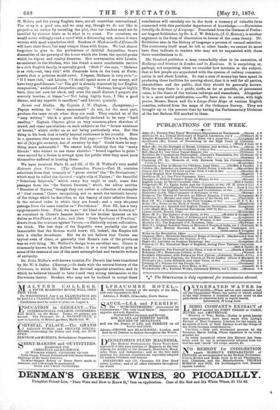We have received Parts IL and HI. of Mr. H.
Walford's very useful Extracts from Cicero. (The Clarendon Press.)—Part II. contains selections from that treasury of "ghost stories" the "Do Divinatione," which may be called the classical "night-side of Nature ;" the beautiful " Somnium Scipionis," which every boy ought to read ; some fine presages from the "De Natura Deorutn," which the editor entitles "Beauties of Nature," though they are rather a collection of examples of "final causes," Cicero recognizing not so much the intrinsic beauty of the things which he describes, as the beauty of their relative fitness to the natural order in which they are found ; and a very eloquent passage from the same treatise on "Providence." Part III. has a very epigrammatic form. First, we have "An Ideal of a Roman Governor," as contained in Cicero'a famous letter to his brother Quintus on his duties as Pro-Prastor of Asia ; and then "Some Specimen of Practice," drawn from the orations against Verres,—a distinctly unjust collocation, we think. The last days of the Republic were probably the most lamentable that the Roman world knew, till, indeed, the Empire fell into a similar decadence. But we do not believe that Verres was typical even of them, or generally that Rome's rule of tho provinces was an evil thing. Mr. Walford's design is an excellent one. Cicero is commonly known by his dullest books ; it is a real benefit to give us some of the essence of one of the most accomplished and versatile writers of antiquity.






























 Previous page
Previous page